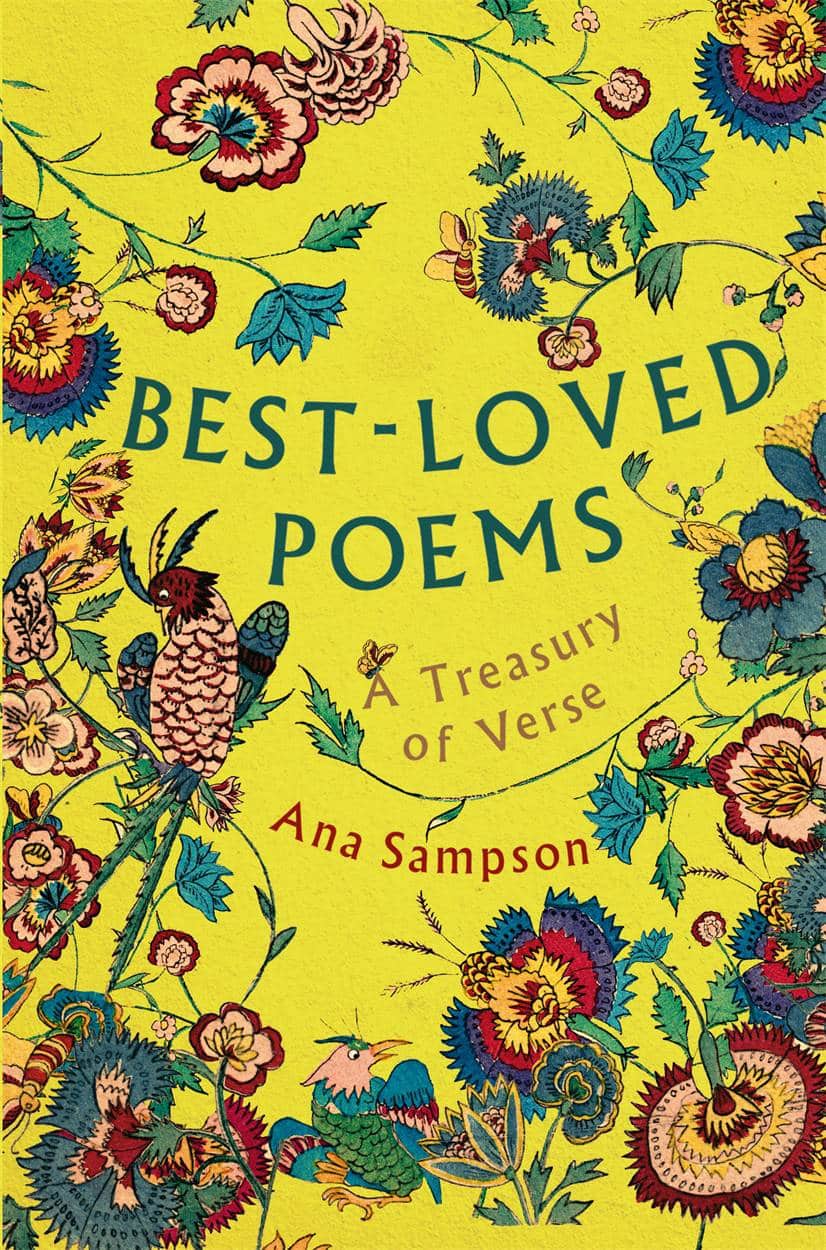September 28 is National Poetry Day. To celebrate, anthologist Ana Sampson tells the Times why poetry is so good for you, and how it is easily accessible to all…
Poetry is seen as a niche interest, something enjoyed by earnest teenagers or self-proclaimed culture vultures, but poetry is for everyone.
In the course of editing five anthologies, I have learned that although our tastes vary widely, we all have a deep well of poems to draw on – even if many of us don’t realise it.
The most common answer when I canvassed opinions on favourite poems was: “Oh, I don’t know anything about poetry.”
As soon as I quoted lines from some of the verses I intended to include in my book, though, everything changed. ‘My love is like a red, red rose’; ‘The Owl and the Pussy-cat went to sea’; ‘Stop all the clocks’; ‘Do not go gentle into
that good night’; ‘They’re changing the
guards at Buckingham Palace’;
‘I wandered lonely as a cloud’… Smiles spread across faces. The next line would be quoted at me, and often a whole verse.
Deborah Alma, The Emergency Poet – whose own anthologies are wonderful – travels the country in a repurposed antique ambulance dispensing poetry for whatever ails people. She explains that it gives people the permission they feel they need to enjoy verse, since it has been prescribed especially for them.
We soak up poetry from our first experience of language. The books we read to children usually rhyme, and woe betide any parent who skips lines to hasten bedtime.
My daughter would solemnly jab at the page until the full text was read, even before she could talk herself. So one of the pleasures of poetry is that it can transport us back to childhood. It has also been used as a therapy for dementia patients, since verses are often retained even when other memories fade.
Life is busy, and it’s often difficult to find time to read a novel. It’s much more feasible to find five minutes to read a poem (as long as you’re not planning to embark on Paradise Lost!) In the space of a few lines, we’re transported to other places, other times and into other lives, flexing our emotional muscles and taking a break from daily life. I’m biased as an anthologist, of course, but I find dipping into a beautiful book increases the pleasure of the act, providing a digital detox now that we read so much on screens.
Poetry has mental benefits, too. It widens our vocabulary and can also help to improve memory if learnt by heart, a practice being revived in schools and by competitions like Poetry By Heart. It’s never too late to begin.
Discard poems that don’t speak to you, ignore the Romantics if you dislike flowery language, avoid war poetry if it leaves you cold, and find the ones that do reach you.
It’s comforting when a poet tells us that we are not alone in our struggles, and exhilarating to find expressed – more elegantly than we ever could – our joys. It’s one of the reasons why we instinctively reach for poetry at weddings and funerals. Somebody has felt this way before!
If you’re anxious or grieving, a poem can help you feel less isolated, even if it was written hundreds of years ago. A poem can also say something that perhaps we can’t if we are unsure about how to convey sympathies, or bashful about proclaiming our love. Candlestick Press publish beautiful pamphlets of verses for just this purpose, to be sent instead of a greetings card.
Resolving to read a poem each day guarantees you a few moments of quiet mindful reflection.
It’s a habit that can boost your mood, provide emotional nourishment and whisk you away from humdrum daily life. It’s never too late to dive into an anthology and begin reaping the rewards!

The Power of Poetry
Try your hand at this fun quiz to see how much you actually know about poetry. You might just surprise yourself
- Why did Edward Lear have his new house built in an exact replica of the old one when he moved?
A: So he could walk around it with his eyes closed
B: So as not to confuse his beloved cat, Foss
C: Queen Victoria had praised his old house
D: So he wouldn’t have to buy any new furniture
2. Whose first marriage was a scandalous elopement with the sixteen-year-old Harriet Westbrook? (His second was no less shocking, since he was still married to Harriet when he took up with his next wife who would later become famous as the author of what became a horror classic.)
A: Percy Bysshe Shelley
B: George Gordon, Lord Byron
C: Samuel Taylor Coleridge
D: Leigh Hunt
3. To whom did Ben Jonson address the lines, “Drink to me, only with thine eyes”?
A: Anne
B: Queen Elizabeth I
C: Celia
D: His Coy Mistress
- At what time does the church clock stand in Rupert Brooke’s The Old Vicarage, Grantchester, while he frets about whether there will still be honey for tea?A: Six o’clock
B: Ten to three
C: Midnight
D: Four o’clock
- Which poet transcribed the traditional New Year’s song Auld Lang Syne?
A: Robert Burns
B: Walter Scott
C: John Skelton
D: Geoffrey Chaucer
6. What were e e cummings’s first names?
A: Edmund Ezekiel
B: Edgar Edward
C: Edward Esltin
D: Ermintrude Edna
7. Which poet made the grand romantic gesture of burying some of his unpublished poems with his wife, only to have her dug up a few years later when he wanted to retrieve them?
A: Dante Gabriel Rossetti
B: Samuel Taylor Coleridge
C: William Wordsworth
D: Robert Southey
- Where did the ‘Old Possum’ in T S Eliot’s Book of Practical Cats originate?A: It was Eliot’s nickname for his godchild, to whom the book was addressed
B: It was Ezra Pound’s nickname for Eliot
C: Eliot had a childhood cat with that name
D: It was the name of a famous cat that lived at Theatre Royal, Drury Lane, London
- What, in the traditional rhyme, “comes in like a lion, goes out like a lamb”?
A: Marriage
B: March
C: Man
D: Spring
10. Which poem was said to have been written in a matter of minutes, inspired by a report the poet had read that morning in The Times?
A: The Soldier by Rupert Brooke
B: In Time of ‘The Breaking of Nations’ by Thomas Hardy
C:Â If by Rudyard Kipling
D: The Charge of the Light Brigade by Alfred Lord Tennyson
11. Whose poem Home-Thoughts, from Abroad has the famous opening: ‘Oh, to be in England / Now that April’s there’?
A: T S Eliot
B: Elizabeth Barrett Browning
C: Robert Browning
D: John Keats
- Which writer spent their childhood writing about the imaginary kingdom of Gondal with their siblings?A: J R R Tolkien
B: C S Lewis
C: Emily Bronte
D: Emily Dickinson13. Who wrote the moralizing Victorian verse The Spider and the Fly, which was memorably parodied by Lewis Carroll in the form of The Mock Turtle’s Song, or Lobster Quadrille (‘”Will you walk a little faster?”, said a whiting to a snail, / “There’s a porpoise close behind us, and he’s treading on my tail.”)?
A: Christina Rossetti
B: Alfred Lord Tennyson
C: Mary Howitt
D: Coventry Patmore
- Who wrote the famous phrase: ‘April is the cruellest month’?A: Wilfred Owen
B: W H Auden
C: John Betjeman
D: T S Eliot
- Whose poem Valentine includes the lines: “My heart has made its mind up / And I’m afraid it’s you”?
A: Stevie Smith
B: Wendy Cope
C: Jenny Joseph
D: Elizabeth Jennings
- Of what does W H Auden ask: “Does it howl like a hungry Alsatian? / Or boom like a military band?”
A: His heartbeat
B: The January wind
C: Love
D: A fever
- All these poets are from Kent. Which one of them lived at Penshurst Place?
A: Geoffrey Chaucer
B: Sir Philip Sidney
C: Christopher Marlowe
D: Thomas Wyatt
- Who had ‘miles to go before I sleep’ in the poem ‘Stopping by Woods on a Snowy Evening’?A: Rudyard Kipling
B: Robert Frost
C: Walter de la Mare
D: T S Eliot
- Which of Edward Lear’s much-loved characters had no toes?
A: The Owl
B: The Pussycat
C: The Jumblies
D: The Pobble
- Whose heroines include Maud and the Lady of Shalott?
A: Alfred, Lord Tennyson
B: Samuel Taylor Coleridge
C: William Wordsworth
D: John Keats
Best-Loved Poems by Ana Sampson is published by Michael O’Mara Books, priced £9.99
Answers to the quiz:
- B
- A
- C
- B
- A
- C
- A
- B
- B
- D
- C
- C
- C
- D
- B
- C
- B
- B
- D
- A
Best-Loved Poems is Ana Sampson’s fifth anthology of well-known poems, and is published by Michael O’Mara Books, priced £9.99 and available from all good bookshops.








